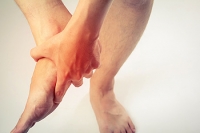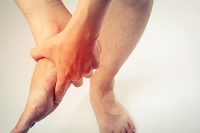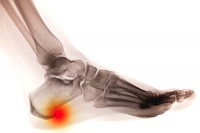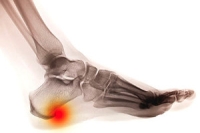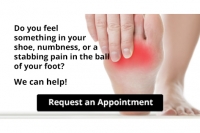
Blog (791)
Are Swollen Feet and Ankles Normal During Pregnancy?
 Many women often experience swollen feet and ankles during their pregnancy. This is commonly referred to as edema. Generally, the swelling is a result of the excess fluid in the body caused by the developing fetus and may become severe during the third trimester. There are several ways to reduce any swelling that may develop in the feet and ankles, including stretching the legs as often as possible, elevating the feet, and limiting standing for extended periods of time. Research has shown that it may be beneficial to lie on the left side while sleeping in addition to consuming plenty of fresh water, which may help to avoid dehydration. It's suggested to speak with a podiatrist who can answer any questions you may have regarding any severe swelling in your feet.
Many women often experience swollen feet and ankles during their pregnancy. This is commonly referred to as edema. Generally, the swelling is a result of the excess fluid in the body caused by the developing fetus and may become severe during the third trimester. There are several ways to reduce any swelling that may develop in the feet and ankles, including stretching the legs as often as possible, elevating the feet, and limiting standing for extended periods of time. Research has shown that it may be beneficial to lie on the left side while sleeping in addition to consuming plenty of fresh water, which may help to avoid dehydration. It's suggested to speak with a podiatrist who can answer any questions you may have regarding any severe swelling in your feet.
Pregnant women with swollen feet can be treated with a variety of different methods that are readily available. For more information about other cures for swollen feet during pregnancy, consult with Dr. Kenneth Donovan from Advanced Care Foot and Ankle. Our doctor will attend to all of your foot and ankle needs.
What Foot Problems Can Arise During Pregnancy?
One problem that can occur is overpronation, which occurs when the arch of the foot flattens and tends to roll inward. This can cause pain and discomfort in your heels while you’re walking or even just standing up, trying to support your baby.
Another problem is edema, or swelling in the extremities. This often affects the feet during pregnancy but tends to occur in the later stages.
How Can I Keep My Feet Healthy During Pregnancy?
- Wearing orthotics can provide extra support for the feet and help distribute weight evenly
- Minimize the amount of time spent walking barefoot
- Wear shoes with good arch support
- Wear shoes that allow for good circulation to the feet
- Elevate feet if you experience swelling
- Massage your feet
- Get regular, light exercise, such as walking, to promote blood circulation to the feet
If you have any questions please feel free to contact one of our offices located in Warren, Livingston, and Toms River, NJ . We offer the newest diagnostic and treatment technologies for all your foot and ankle needs.
Reminder: When Was the Last Time…?
Reminder: When Was the Last Time...?
Causes of Neuropathy in the Feet
The most common type of neuropathy in the feet is referred to as peripheral neuropathy. The brain receives signals from the peripheral nerves and if this ceases to occur, these nerves may be damaged. This condition is frequently observed in diabetics and in patients who have circulation disorders. Additional causes of this ailment may include poor eating habits, alcoholism, and possibly toxic chemical exposure. Symptoms of neuropathy in the feet may include a burning and tingling sensation in the toes and the feet may gradually become numb. Walking may become affected in addition to experiencing difficulty in performing daily activities. A podiatrist can provide a proper diagnosis as well as determining the severity of this condition.
Neuropathy
Neuropathy can be a potentially serious condition, especially if it is left undiagnosed. If you have any concerns that you may be experiencing nerve loss in your feet, consult with Dr. Kenneth Donovan from Advanced Care Foot and Ankle. Our doctor will assess your condition and provide you with quality foot and ankle treatment for neuropathy.
What Is Neuropathy?
Neuropathy is a condition that leads to damage to the nerves in the body. Peripheral neuropathy, or neuropathy that affects your peripheral nervous system, usually occurs in the feet. Neuropathy can be triggered by a number of different causes. Such causes include diabetes, infections, cancers, disorders, and toxic substances.
Symptoms of Neuropathy Include:
- Numbness
- Sensation loss
- Prickling and tingling sensations
- Throbbing, freezing, burning pains
- Muscle weakness
Those with diabetes are at serious risk due to being unable to feel an ulcer on their feet. Diabetics usually also suffer from poor blood circulation. This can lead to the wound not healing, infections occurring, and the limb may have to be amputated.
Treatment
To treat neuropathy in the foot, podiatrists will first diagnose the cause of the neuropathy. Figuring out the underlying cause of the neuropathy will allow the podiatrist to prescribe the best treatment, whether it be caused by diabetes, toxic substance exposure, infection, etc. If the nerve has not died, then it’s possible that sensation may be able to return to the foot.
Pain medication may be issued for pain. Electrical nerve stimulation can be used to stimulate nerves. If the neuropathy is caused from pressure on the nerves, then surgery may be necessary.
If you have any questions, please feel free to contact one of our offices located in Warren, Livingston, and Toms River, NJ . We offer the newest diagnostic and treatment technologies for all your foot care needs.
Causes of Neuropathy in the Feet
 The most common type of neuropathy in the feet is referred to as peripheral neuropathy. The brain receives signals from the peripheral nerves and if this ceases to occur, these nerves may be damaged. This condition is frequently observed in diabetics and in patients who have circulation disorders. Additional causes of this ailment may include poor eating habits, alcoholism, and possibly toxic chemical exposure. Symptoms of neuropathy in the feet may include a burning and tingling sensation in the toes and the feet may gradually become numb. Walking may become affected in addition to experiencing difficulty in performing daily activities. A podiatrist can provide a proper diagnosis as well as determining the severity of this condition.
The most common type of neuropathy in the feet is referred to as peripheral neuropathy. The brain receives signals from the peripheral nerves and if this ceases to occur, these nerves may be damaged. This condition is frequently observed in diabetics and in patients who have circulation disorders. Additional causes of this ailment may include poor eating habits, alcoholism, and possibly toxic chemical exposure. Symptoms of neuropathy in the feet may include a burning and tingling sensation in the toes and the feet may gradually become numb. Walking may become affected in addition to experiencing difficulty in performing daily activities. A podiatrist can provide a proper diagnosis as well as determining the severity of this condition.
Neuropathy
Neuropathy can be a potentially serious condition, especially if it is left undiagnosed. If you have any concerns that you may be experiencing nerve loss in your feet, consult with Dr. Kenneth Donovan from Advanced Care Foot and Ankle. Our doctor will assess your condition and provide you with quality foot and ankle treatment for neuropathy.
What Is Neuropathy?
Neuropathy is a condition that leads to damage to the nerves in the body. Peripheral neuropathy, or neuropathy that affects your peripheral nervous system, usually occurs in the feet. Neuropathy can be triggered by a number of different causes. Such causes include diabetes, infections, cancers, disorders, and toxic substances.
Symptoms of Neuropathy Include:
- Numbness
- Sensation loss
- Prickling and tingling sensations
- Throbbing, freezing, burning pains
- Muscle weakness
Those with diabetes are at serious risk due to being unable to feel an ulcer on their feet. Diabetics usually also suffer from poor blood circulation. This can lead to the wound not healing, infections occurring, and the limb may have to be amputated.
Treatment
To treat neuropathy in the foot, podiatrists will first diagnose the cause of the neuropathy. Figuring out the underlying cause of the neuropathy will allow the podiatrist to prescribe the best treatment, whether it be caused by diabetes, toxic substance exposure, infection, etc. If the nerve has not died, then it’s possible that sensation may be able to return to the foot.
Pain medication may be issued for pain. Electrical nerve stimulation can be used to stimulate nerves. If the neuropathy is caused from pressure on the nerves, then surgery may be necessary.
If you have any questions, please feel free to contact one of our offices located in Warren, Livingston, and Toms River, NJ . We offer the newest diagnostic and treatment technologies for all your foot care needs.
Mariners’ Dee Gordon Suffers Broken Toe
Mariners’ second baseman Dee Gordon was seen fielding ground balls before the team’s series opener with the Twins. This is major news for the Mariners, a team who was without Gordon after he suffered a broken toe injury.
In regards to the injury, team manager Scott Servais mentioned, “He won't do any hard running or anything for a few days. But he's feeling better.” Gordon has been wearing a walking boot recently in order to keep pressure off of his right foot. He initially suffered the injury after being hit by a foul ball; the injury was aggravated when he attempted to make a diving catch of a bloop single in shallow right field.
Broken toes may cause a lot of pain and should be treated as soon as possible. If you have any concerns about your feet, contact Dr. Kenneth Donovan from Advanced Care Foot and Ankle. Our doctor will treat your foot and ankle needs.
What Is a Broken Toe?
A broken toe occurs when one or more of the toe bones of the foot are broken after an injury. Injuries such as stubbing your toe or dropping a heavy object on it may cause a toe fracture.
Symptoms of a Broken Toe
- Swelling
- Pain (with/without wearing shoes)
- Stiffness
- Nail Injury
Although the injured toe should be monitored daily, it is especially important to have a podiatrist look at your toe if you have severe symptoms. Some of these symptoms include worsening or new pain that is not relieved with medication, sores, redness, or open wounds near the toe.
If you have any questions, please feel free to contact one of our offices located in Warren, Livingston, and Toms River, NJ. We offer the newest diagnostic and treatment technologies for all your foot care needs.
Mariners’ Dee Gordon Suffers Broken Toe
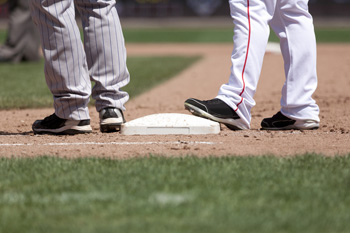 Mariners’ second baseman Dee Gordon was seen fielding ground balls before the team’s series opener with the Twins. This is major news for the Mariners, a team who was without Gordon after he suffered a broken toe injury. In regards to the injury, team manager Scott Servais mentioned, “He won't do any hard running or anything for a few days. But he's feeling better.” Gordon has been wearing a walking boot recently in order to keep pressure off of his right foot. He initially suffered the injury after being hit by a foul ball; the injury was aggravated when he attempted to make a diving catch of a bloop single in shallow right field.
Mariners’ second baseman Dee Gordon was seen fielding ground balls before the team’s series opener with the Twins. This is major news for the Mariners, a team who was without Gordon after he suffered a broken toe injury. In regards to the injury, team manager Scott Servais mentioned, “He won't do any hard running or anything for a few days. But he's feeling better.” Gordon has been wearing a walking boot recently in order to keep pressure off of his right foot. He initially suffered the injury after being hit by a foul ball; the injury was aggravated when he attempted to make a diving catch of a bloop single in shallow right field.
Broken toes may cause a lot of pain and should be treated as soon as possible. If you have any concerns about your feet, contact Dr. Kenneth Donovan from Advanced Care Foot and Ankle. Our doctor will treat your foot and ankle needs.
What Is a Broken Toe?
A broken toe occurs when one or more of the toe bones of the foot are broken after an injury. Injuries such as stubbing your toe or dropping a heavy object on it may cause a toe fracture.
Symptoms of a Broken Toe
- Swelling
- Pain (with/without wearing shoes)
- Stiffness
- Nail Injury
Although the injured toe should be monitored daily, it is especially important to have a podiatrist look at your toe if you have severe symptoms. Some of these symptoms include worsening or new pain that is not relieved with medication, sores, redness, or open wounds near the toe.
If you have any questions, please feel free to contact one of our offices located in Warren, Livingston, and Toms River, NJ . We offer the newest diagnostic and treatment technologies for all your foot care needs.
How Do Heel Spurs Develop?
A heel spur is a regeneration of a bone that forms on the sole of the foot. Additionally, the development of this ailment can appear in the area where the Achilles tendon connects to the heel and may produce severe pain. In most cases, a heel spur will gradually develop, and is often caused by strain experienced by the muscles and ligaments. Causes of this type of discomfort may originate from shoes that fit incorrectly, additional body weight the feet must endure, or an injury that caused the heel to bruise. Paying close attention to the general health of the feet may be a successful prevention technique for heel spurs. This may include noticing any type of aches and pain that may appear, especially on the sole of the foot. Moderate relief may be obtained from resting the foot in addition to performing gentle stretching exercises. It’s suggested to consult with a podiatrist for treatment options for heel spurs, which may include surgery.
Heel spurs can be incredibly painful and sometimes may make you unable to participate in physical activities. To get medical care for your heel spurs, contact Dr. Kenneth Donovan from Advanced Care Foot and Ankle. Our doctor will do everything possible to treat your condition.
Heels Spurs
Heel spurs are formed by calcium deposits on the back of the foot where the heel is. This can also be caused by small fragments of bone breaking off one section of the foot, attaching onto the back of the foot. Heel spurs can also be bone growth on the back of the foot and may grow in the direction of the arch of the foot.
Older individuals usually suffer from heel spurs and pain sometimes intensifies with age. One of the main condition's spurs are related to is plantar fasciitis.
Pain
The pain associated with spurs is often because of weight placed on the feet. When someone is walking, their entire weight is concentrated on the feet. Bone spurs then have the tendency to affect other bones and tissues around the foot. As the pain continues, the feet will become tender and sensitive over time.
Treatments
There are many ways to treat heel spurs. If one is suffering from heel spurs in conjunction with pain, there are several methods for healing. Medication, surgery, and herbal care are some options.
If you have any questions feel free to contact one of our offices located in Warren, Livingston, and Toms River, NJ. We offer the latest in diagnostic and treatment technology to meet your needs.
How Do Heel Spurs Develop?
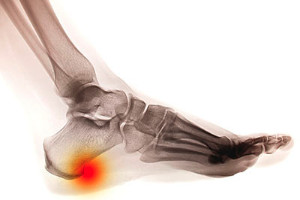 A heel spur is a regeneration of a bone that forms on the sole of the foot. Additionally, the development of this ailment can appear in the area where the Achilles tendon connects to the heel and may produce severe pain. In most cases, a heel spur will gradually develop, and is often caused by strain experienced by the muscles and ligaments. Causes of this type of discomfort may originate from shoes that fit incorrectly, additional body weight the feet must endure, or an injury that caused the heel to bruise. Paying close attention to the general health of the feet may be a successful prevention technique for heel spurs. This may include noticing any type of aches and pain that may appear, especially on the sole of the foot. Moderate relief may be obtained from resting the foot in addition to performing gentle stretching exercises. It’s suggested to consult with a podiatrist for treatment options for heel spurs, which may include surgery.
A heel spur is a regeneration of a bone that forms on the sole of the foot. Additionally, the development of this ailment can appear in the area where the Achilles tendon connects to the heel and may produce severe pain. In most cases, a heel spur will gradually develop, and is often caused by strain experienced by the muscles and ligaments. Causes of this type of discomfort may originate from shoes that fit incorrectly, additional body weight the feet must endure, or an injury that caused the heel to bruise. Paying close attention to the general health of the feet may be a successful prevention technique for heel spurs. This may include noticing any type of aches and pain that may appear, especially on the sole of the foot. Moderate relief may be obtained from resting the foot in addition to performing gentle stretching exercises. It’s suggested to consult with a podiatrist for treatment options for heel spurs, which may include surgery.
Heel spurs can be incredibly painful and sometimes may make you unable to participate in physical activities. To get medical care for your heel spurs, contact Dr. Kenneth Donovan from Advanced Care Foot and Ankle. Our doctor will do everything possible to treat your condition.
Heels Spurs
Heel spurs are formed by calcium deposits on the back of the foot where the heel is. This can also be caused by small fragments of bone breaking off one section of the foot, attaching onto the back of the foot. Heel spurs can also be bone growth on the back of the foot and may grow in the direction of the arch of the foot.
Older individuals usually suffer from heel spurs and pain sometimes intensifies with age. One of the main condition's spurs are related to is plantar fasciitis.
Pain
The pain associated with spurs is often because of weight placed on the feet. When someone is walking, their entire weight is concentrated on the feet. Bone spurs then have the tendency to affect other bones and tissues around the foot. As the pain continues, the feet will become tender and sensitive over time.
Treatments
There are many ways to treat heel spurs. If one is suffering from heel spurs in conjunction with pain, there are several methods for healing. Medication, surgery, and herbal care are some options.
If you have any questions feel free to contact one of our offices located in Warren, Livingston, and Toms River, NJ . We offer the latest in diagnostic and treatment technology to meet your needs.




